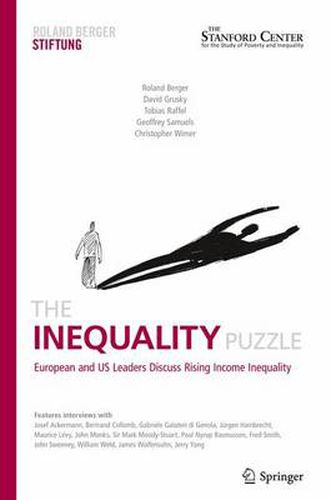Readings Newsletter
Become a Readings Member to make your shopping experience even easier.
Sign in or sign up for free!
You’re not far away from qualifying for FREE standard shipping within Australia
You’ve qualified for FREE standard shipping within Australia
The cart is loading…






Is there too much inequality? We are witnessing for the first time in many decades a vigorous public debate in the United States and many European countries as to whether income inequality is approaching unjustifiable levels. The financial crisis has drawn special attention to remuneration at financial firms, as well as other more broadly based increases in inequality, and the pendulum may well have swung back toward attitudes favoring strengthened regulations. It is against this background of shifting public and political views about income inequality that the Roland Berger Foundation decided to solicit the opinions of U. S. and European political, business, and labor leaders by partnering with the Stanford Center for the Study of Poverty and Inequality. This initiative, led by a diverse team of five authors, sought to cast light on how prominent European and U. S. leaders are making sense of rising inequality. The objective was not to provide yet another scholarly tome on inequality, or another analysis of how the general public views inequality. We are already awash in such analyses. What we don’t know, and what we have sought to offer, is a window into how senior leaders view this historic moment. In the summer of 2009, we interviewed thirteen political, business, and labor leaders and presented these interviews in their original form.
$9.00 standard shipping within Australia
FREE standard shipping within Australia for orders over $100.00
Express & International shipping calculated at checkout
Is there too much inequality? We are witnessing for the first time in many decades a vigorous public debate in the United States and many European countries as to whether income inequality is approaching unjustifiable levels. The financial crisis has drawn special attention to remuneration at financial firms, as well as other more broadly based increases in inequality, and the pendulum may well have swung back toward attitudes favoring strengthened regulations. It is against this background of shifting public and political views about income inequality that the Roland Berger Foundation decided to solicit the opinions of U. S. and European political, business, and labor leaders by partnering with the Stanford Center for the Study of Poverty and Inequality. This initiative, led by a diverse team of five authors, sought to cast light on how prominent European and U. S. leaders are making sense of rising inequality. The objective was not to provide yet another scholarly tome on inequality, or another analysis of how the general public views inequality. We are already awash in such analyses. What we don’t know, and what we have sought to offer, is a window into how senior leaders view this historic moment. In the summer of 2009, we interviewed thirteen political, business, and labor leaders and presented these interviews in their original form.